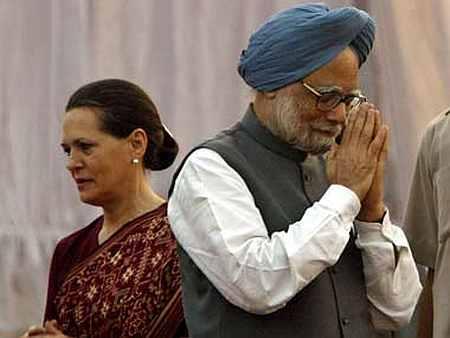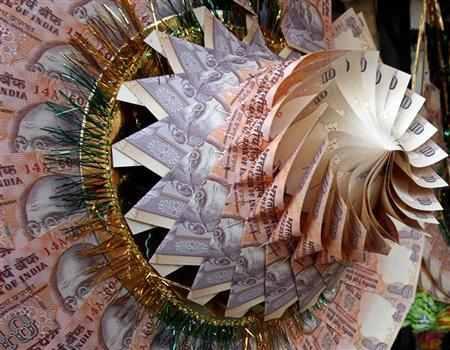Photographs: Reuters Ravi Shanker Kapoor
The speed at which political statements of doubtful veracity acquire the aura of gospel truth is astonishing. One such "truth" is: coalition compulsions impede economic reforms. Even Chief Economic Advisor Kaushik Basu believes in it. He recently said, "Thanks to coalitional democracy, there is some slowdown in economic reforms and decision-making."
A few weeks earlier, Finance Minister Pranab Mukherjee had expressed similar views: "With a fractured mandate, yes, you can rule. But you have to carry other people with you."
That's right, but post-liberalisation, India has never seen a solid mandate for any party; it has been the era of coalitions. In fact, liberalisation itself was carried out by a coalition government. But the then Prime Minister P V Narasimha Rao was keen to open up the economy; the same cannot be said about the ruling United Progressive Alliance (UPA).
...
What is thwarting the growth in the country?
Photographs: Adnan Abidi/Reuters
Worse, the Congress-led regime has taken a number of steps that militate against the spirit of economic reforms. Consider the case of food security legislation. Commission for Agricultural Costs and Prices Chairman and prominent agricultural economist Ashok Gulati believes that the proposed Bill, cleared by the Cabinet in December last year, has the potential of taking the economy to the "crisis levels of 1991".
The Prime Minister's Economic Advisory Committee, headed by former Reserve Bank Governor C Rangarajan, had serious differences with the Sonia Gandhi-led National Advisory Council (NAC) over the scale of the entitlement project.
Agriculture Minister Sharad Pawar, too, was worried over financial implications. The food security legislation is also feared to drive out private companies.
...
What is thwarting the growth in the country?
Photographs: B Mathur/Reuters
The moral hazard is no less frightening; for the law, if executed, would give a fillip to the process of transforming free citizens into serfs, always looking at askance at the giant feudal lord, the Indian state -- for relief, poverty alleviation, employment (the rural jobs scheme), and now even for food.
Government size and scope will increase. The raison d'etre of economic reforms was the reversal of this transformation that began during over four decades of socialism; downsizing government and its role was part and parcel of the attempted reversal.
But NAC bleeding hearts have had their way. And there is a possibility that the fiscally ruinous and morally hazardous project would be implemented. By the way, no Congress ally is forcing the government to go for the Bill.
...
What is thwarting the growth in the country?
Photographs: Fayaz Kabli/Reuters
The strains on the public exchequer are showing because of mindless populism. The fiscal responsibility law is practically dead; the deficit is assuming alarming proportions; and a desperate finance ministry is taking recourse to desperate measures, as evident in the Vodafone case.
The taxmen lost the case against the telecom major in the Supreme Court. But the ministry is restless; it is trying all sorts of tricks; it wants to apply laws retrospectively and arm tax officials with discretionary powers. India Inc, the international business community, and even foreign governments are upset.
It needs to be mentioned that earlier, too, in 2005, the government had refused to respect the apex court's verdict in a Rs 800-crore (Rs 8-billion) tax case that had gone in favour of ITC; it had promulgated an ordinance and managed to extract Rs 350 crore (Rs 3.5 billion) from the company.
...
What is thwarting the growth in the country?
Photographs: Punit Paranjpe/Reuters
A government cannot expect to disrespect the rule of law and (concomitantly) attract investors. The rule of law is the foundation of economic reforms. The government itself has shaken the foundation, and there is no coalition compulsion involved.
Nor is there any pressure from any allies to keep Air India (AI) running. One need not be an aviation expert or a financial wizard to say the national carrier is beyond redemption.
Yet, AI – which loses Rs 10 crore (Rs 100 million) every day, has debt worth Rs 43,000 crore (Rs 430 billion) and accumulated losses in the region of Rs 20,000 – recently got a Rs 30,000-crore (Rs 300 billion) revival package. The government sticks to the socialist dogma of "no privatisation," despite the UPA's dissociation with the Left.
...
What is thwarting the growth in the country?
Photographs: Reuters
Then there are green lobbyists who enjoy the patronage of the presiding deities of the ruling alliance. NAC members N C Saxena and Aruna Roy, for instance, are opposed to the $12-billion Posco project, the largest foreign direct investment in India.
And they have succeeded so far in frustrating the efforts of the Korean steel company, the Orissa government, and even of Prime Minister Manmohan Singh with whom Seoul has taken up the matter more than once. Worse, the greens' opposition to Posco is doctrinaire and not fact-based.
Electoral politics has also had its share of victims. Aiming to win over the local populace by demagoguery, Congress leader Rahul Gandhi torpedoed Vedanta's bid to mine bauxite in the Niyamgiri hills of Orissa. The grand old party may or may not gain in electoral terms, but the state and its people have certainly lost the benefits that might have come to them because of the project.
...
What is thwarting the growth in the country?
Photographs: Reuters
Apart from ideological and electoral reasons, capricious and erratic governance has also harmed the cause of development. Years after work in Lavasa began, the government realised that the ambitious realty project was responsible for violations.
Yet another example of dirigiste mindset is the grant of first compulsory licence for a pharmaceutical product in March this year.
It needs to be mentioned that no Congress ally is involved in jeopardising industrialisation in the name of environment protection or affordable medication.
There are many more instances revealing the pro-Left leanings and anti-reforms biases of the UPA. Coalition compulsions have little to do with the big state imperative.
The author is a freelance journalist.









article